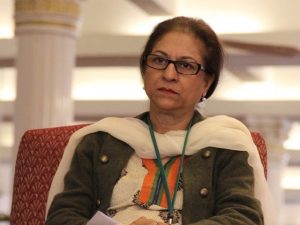Asma Jahangir is no more. Death (cardiac arrest) was sudden, dramatic almost taking away Asma at a time when this region needed her the most. As warmongers dominate and the language of hate between India and Pakistan holds sway, even as civilians and soldiers die by the dozens, Asma’s voice for peace remained firm and uncompromising. No one could buy her, no government entice her, as she stood like a beacon and an inspiration for all in her quest for peace.
Asma emerged as a strong critic of Pakistans military governments, and would often chide me for even thinking that a non-civilian government could deliver the goods. “We need democracy, we know it is weak, we need it to become strong and that cannot happen under the uniform”, she would say. We used to sit in her house—nay live in her house in Lahore—having long discussions into the night, discussing the differences, and finding solace in the similarities between India and Pakistan.
She would laugh at New Delhi, that would welcome her with open arms, the embrace being directly in poportion to her criticism of the government in Islamabad. There were times when she was a top favourite of the Indian Foreign Office that would lay out the red carpet for Asma, so that she could travel across India criticising military rule in Pakistan that she had always consistently opposed. When we pointed it out, she would laugh and say, “I know, you think I don’t but that’s all right, we need a civilian government in Islamabad.”
Asma suffered like those who opposed the military in her country did. She would worry about her family, and was determined that those closest to her found a life outside Pakistan. She loved her country, was clear that she would not leave, but fearful for the safety of those associated with her would tell us that while she was prepared to face the bullet, she would not be able to bear anything untoward happening to those she loved. She was torn between pride and fear when her girl entered journalism, as she knew that the wrath of the state had overturned many a life in Pakistan. As indeed in India.
Yes, Asma won several awards. She was celebrated by peace lovers across the world. She was a celebrity. But her two feet remained firmly on the ground. She would smile her way through adversity and fame with equal measure and was clear that for her life was not an affair with the drawing room, but an experience in the field, where she did not hesitate to speak out regardless of the attack on her. She took on the military and the fundamentalists both despite the threats. For her both were the enemy, and had to be fought for a strong, democratic Pakistan.
I spoke to her, but did not meet Asma as the situation in India turned, and worsened with the democracy that we had taken for granted under threat. I wonder what she would have said, as she did admire the progress India had made, away from the military, and away from fundamentalism to embrace a secular, democratic order. She was disillusioned I know, but she would have urged us to fight, and pointed out that while in Pakistan she was one of few, in India we at least had the advantage of being one of the many.
For the cynics, let me add that Asma’s quest for peace might not have convinced those who feed on war, but it has institutionalised peace in the region. There is a constituency for peace, as consistent and as determined as she was. Uncompromising, relentless, and optimistic that will survive the canons of war, and be there to mop up the mess and usher in peace. One day, soon.
One can still see Asma’s petite figure, alert flashing eyes, a tentative smile playing on her lips as she argued passionately for peace. What a truly phenomenal woman, who we took for granted while she was alive. And are now crushed by the loss.





